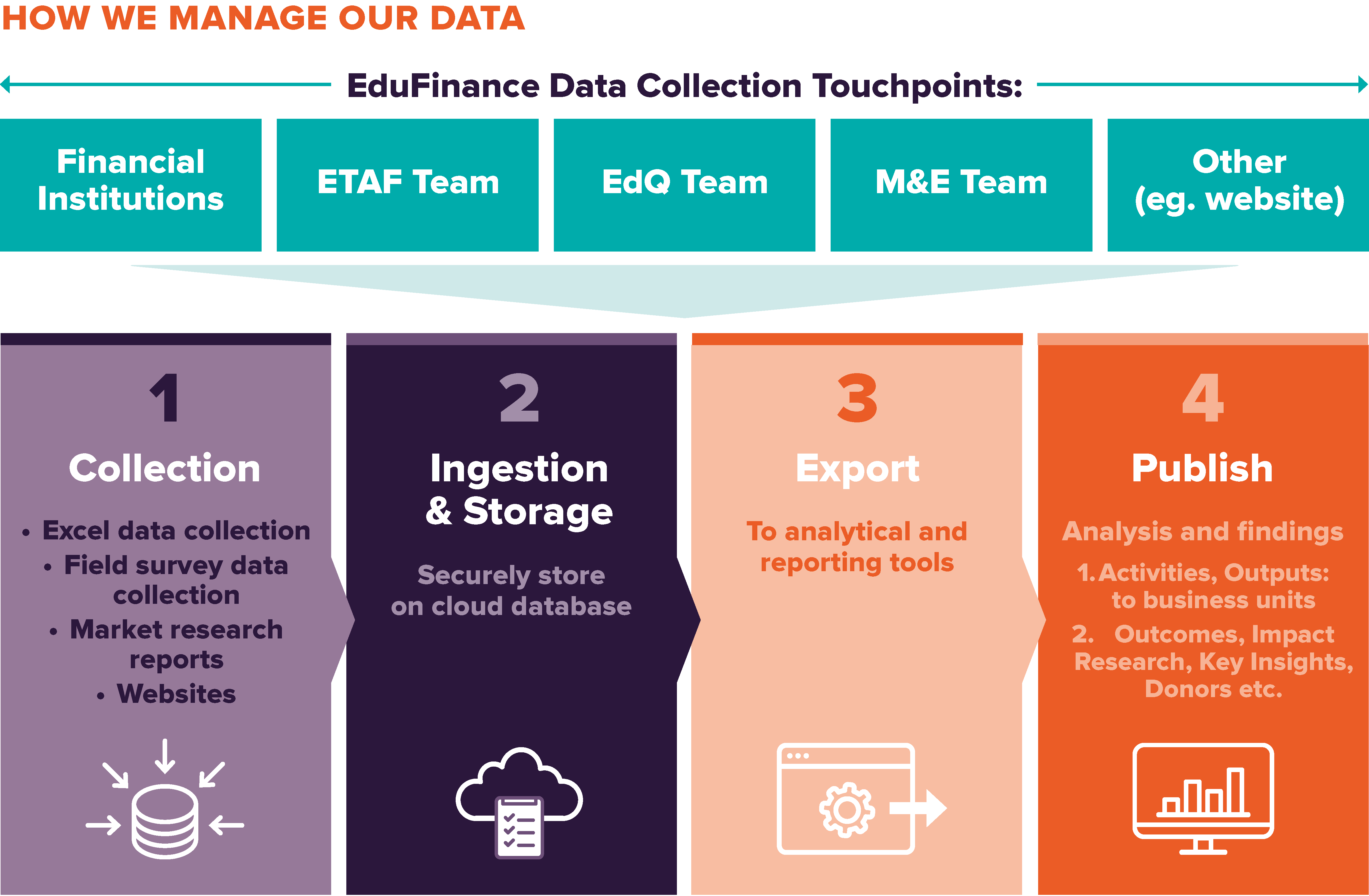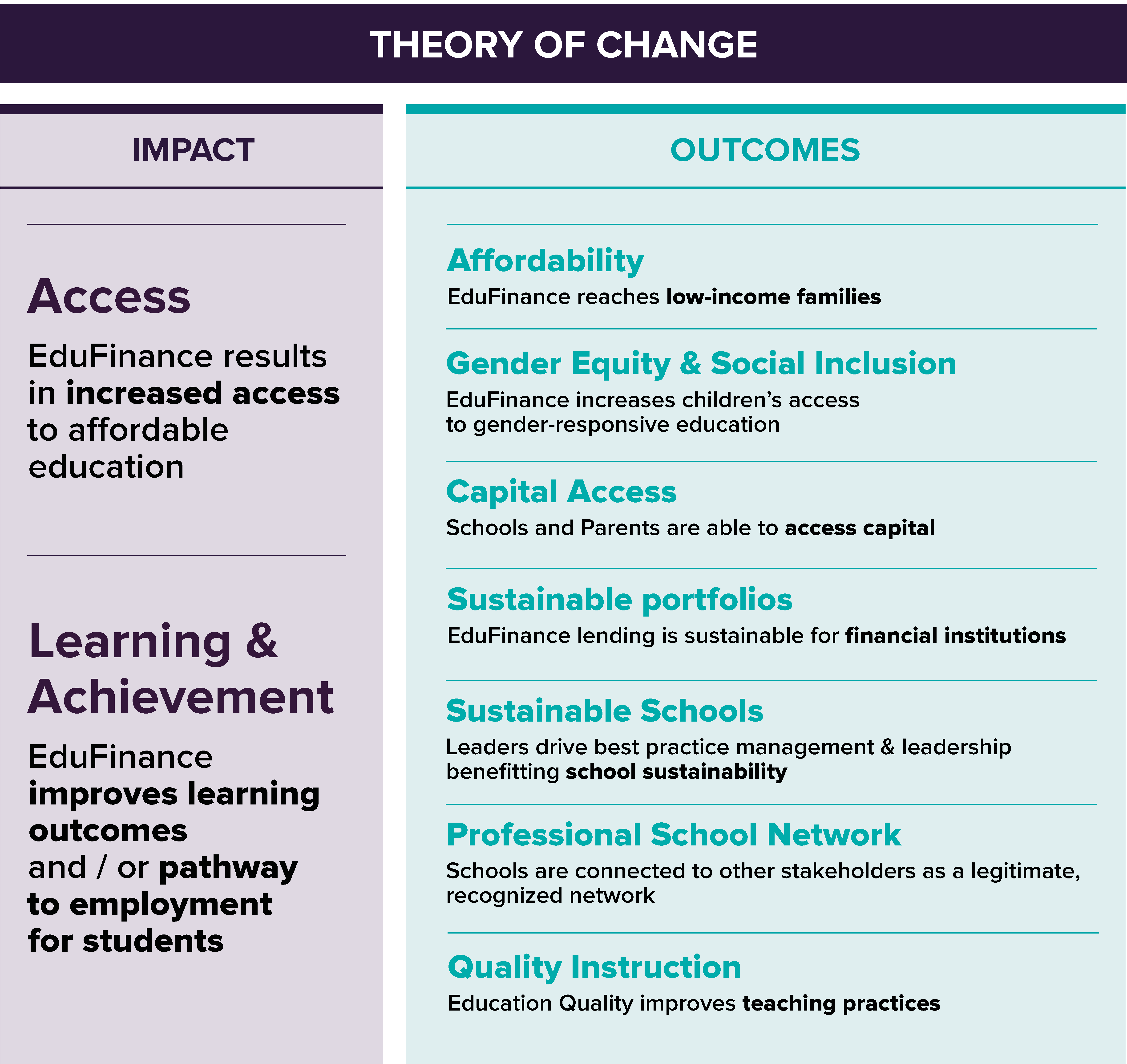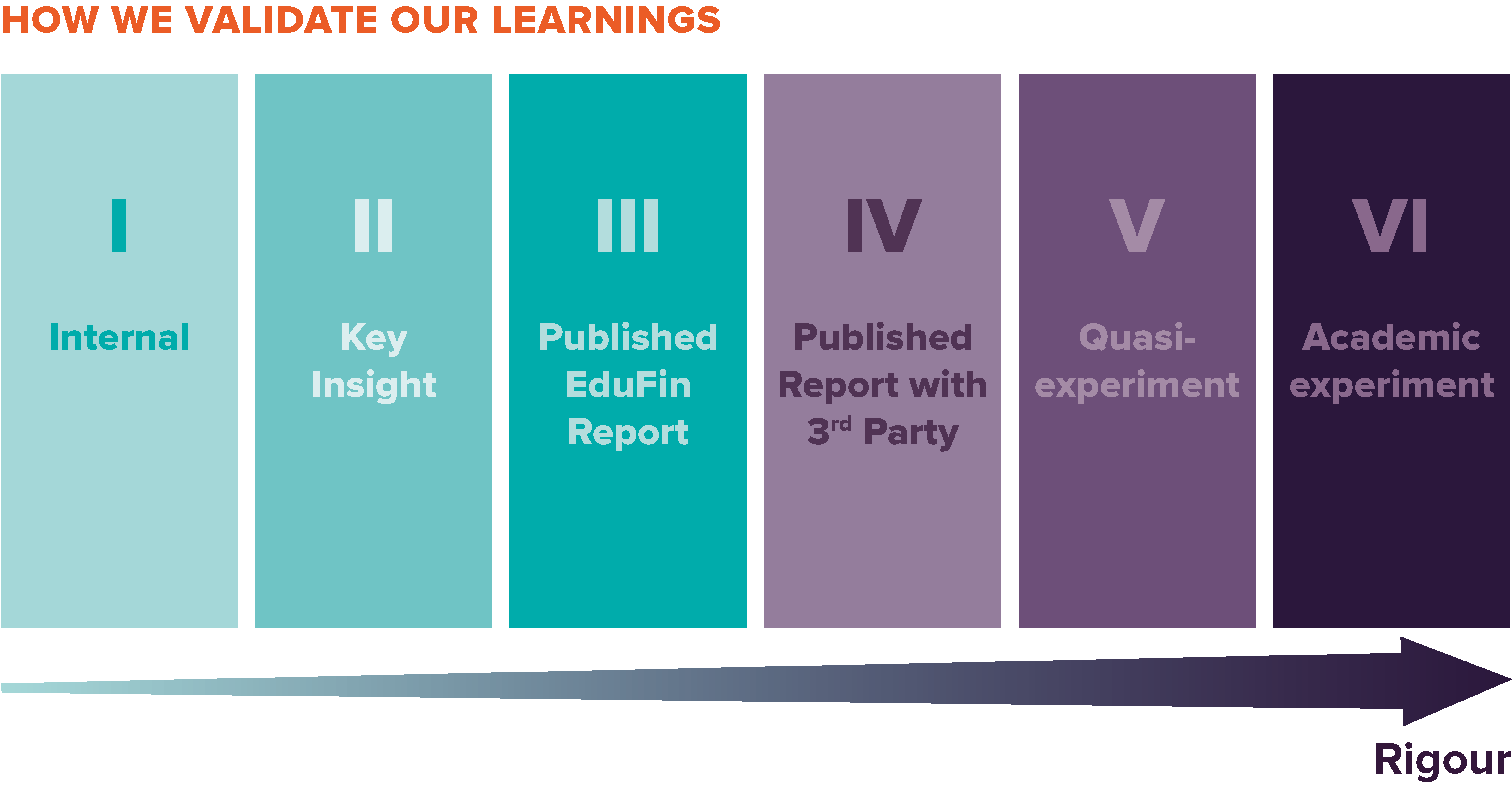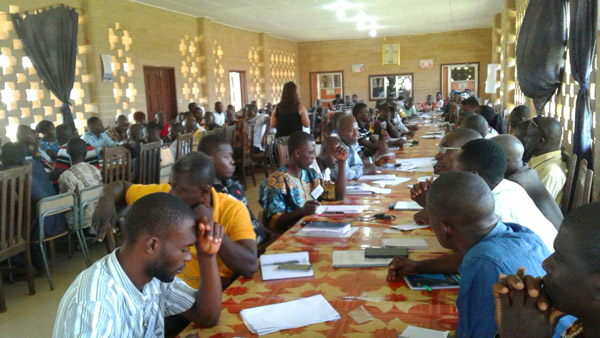What We Do Monitoring, Evaluation and Learning
Data can inform effective decision-making that targets resources and activities around key drivers of improved access to quality education. Yet almost no significant data sets exist on a meaningful scale for affordable non-state schools in low-income communities.
The EduFinance Monitoring, Evaluation and Learning (MEL) team is working to change this and leverage the power of big data to get more children into better schools.
EduFinance Monitoring, Evaluation & Learning
Data is central to EduFinance’s work. Our MEL Team harnesses the power of data to drive better service delivery to financial institutions, schools, parents, and donors. By organizing this data into databases and through rigorous analysis and monitoring results, we can identify key areas of success, points for improvement and generate new ideas efficiently, while also sharing our knowledge.
MEL plays a critical in EduFinance’s ability to drive impact by:
- Providing a holistic picture of our partner interactions across multiple touch points by maintaining an integrated database
- Institutionalizing EduFinance program knowledge, capturing accessible data over the life of the program
- Identifying learnings through robust data analysis, which highlight key drivers of impact, inform our decisions, and enable us to continually improve of program content and delivery strategies
- Sharing our deep knowledge and best practices with partners across the sector, working to build capacity that ultimately benefits education access and quality
EduFinance Data Management Framework
There are data collection touchpoints across all of our program teams and partners ensuring the MEL Team can support them effectively. This data is used to track activites and outputs, as well as measure outcomes and impact.
Because of the high volume on data points collected, a comprehensive approach to data management is critical – from data collection to publishing.

Using Data to Support our Partners
As a fast-growing and dynamic organization, the EduFinance MEL team uses multiple survey tools to measure program performance and evaluate results. Combining this data allows us to analyze and optimize the impact of our program has on creating sustainable EduFinance portfolios and quality learning environments for children.
EduFinance also uses data to directly benefit our partners in real time, equipping them with analysis and information that empowers them to make informed decisions for their financial institutions, their schools and their own professional development.
FINANCIAL INSTITUTIONS
EduFinance aims to empower Financial Institution partners to build productive, high-quality, and sustainable Education Finance portfolios.
To support this goal, Financial Institution partners submit monthly EduFinance loan portfolio data to the MEL team. The team then creates a monthly “EdPack” dashboard analysis that covers historical trends in portfolio outstanding, disbursements, risk, sustainability and impact and is presented in an easy-to-understand visual format, facilitating an on-going dialogue with the financial institution.
Using their EdPack dashboards, partners can make more informed decisions to leverage market opportunities and target more investments into the local education sector.
Other MEL support includes:
- EduFinance credit algorithm
- Market research data analysis
- Feedback survey analysis from financial institution staff training workshops
SCHOOL LEADERS
School leaders that are equipped with information on objective criteria for quality education and how their school compares can make informed decisions how to invest their time and resources to drive quality improvements.
Because EduQuality uses a blended-learning approach that includes tablet-based surveys linked to the MEL database, school leaders now have access to their school’s submitted program data available on their tablets for easy reference. This includes each school’s:
- Annual Pathways to Excellence school self-assessment scores on 18 domains of quality
- Annual school development plans for implementation
Collecting data digitally also enables the MEL and EduQuality teams to measure progress and impact at a country, regional and global level, focusing on finding additional improvements to further scale the program to reach more schools.
TEACHER MENTORS
When teacher mentors have a clear understanding of their own levels of comprehension and confidence in best practice teaching techniques, they are empowered to drive their own professional development.
Mentors complete digital quizzes on comprehension and surveys on confidence levels by topic throughout their interactive training sessions that are submitted to the MEL database. Mentors can see their own scores and responses on their tablets in real time, guiding them to go back and further review specific techniques they have yet to fully master.
The MEL Team uses the same data to identify overall areas of strengths and weaknesses across mentor cohorts, sharing this analysis with the EduQuality team for ongoing program adjustments.
Prioritizing Learning for Greater Impact
EduFinance believes we cannot achieve our mission to get more children into better schools without prioritizing learning.
By continuously identifying learnings through analysis of the data sets we collect, the experiences from our technical staff, and new primary research, we can better understand and focus resources on the biggest drivers of impact in our program.
EduFinance also strives to be a thought leader in the affordable non-state school sector and widely share key learnings that add value to other actors in the sector collective working to improve access to quality education.
VALIDATING THE EDUFINANCE THEORY OF CHANGE
EduFinance aims to validate the stated outcomes and impact of our Theory of Change, using a range of research tools and methods.

SCALES OF VALIDATION
EduFinance believes that learning is critical to continually adapting our program, and therefore requires a ‘scaled validation’ approach across a spectrum of rigor. Validation of EduFinance activities can range from:
- Internal analysis and business intelligence data, which provide quick insights through less rigorous analysis that can inform timely program adaptations
- Third party academic validation, often over multiple years, which is more rigorous and provides a high level of confidence in endline findings.

ACADEMIC PARTNERSHIPS
EduFinance continues to engage external research partners to design special studies, collect new primary data, and share raw data sets to do deep-dives into specific areas EduFinance wants to better understand to further iterate our program for greater impact.
Here is a list of past and current research partners.
LEARNING PUBLICATIONS
Explore our latest Key Insights and Learning Reports under Publications to learn more!


